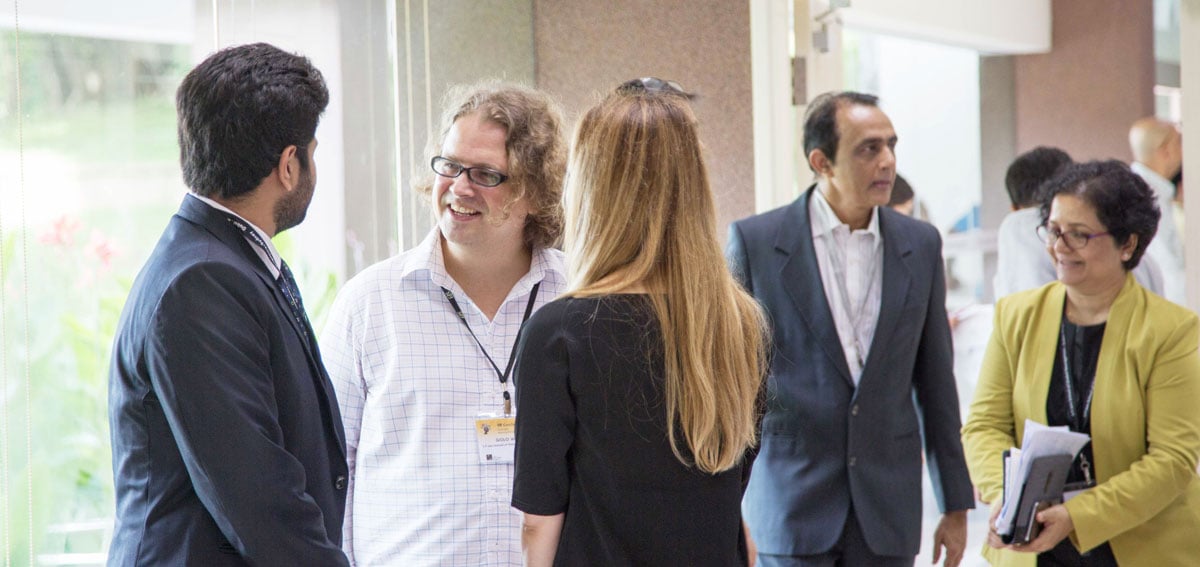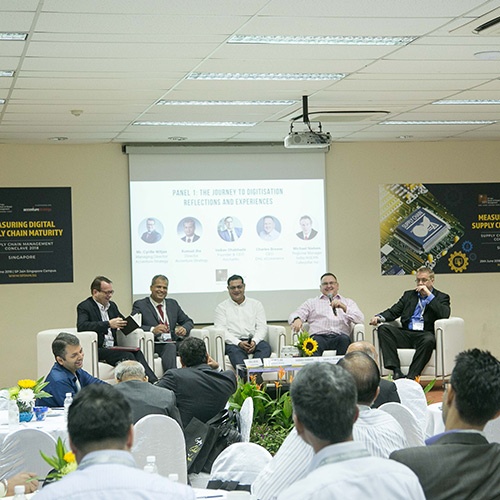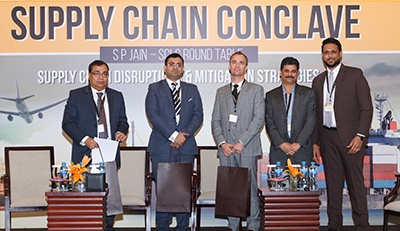
S P Jain School of Global Management conducted the fourth Supply Chain Management Conclave in March, 2017 at the School’s Dubai and Singapore campuses. With the theme Supply Chain Disruption and Mitigation Strategies, prominent industry leaders fronted panel discussions on Lessons from Recent Supply Chain Disruptions and Mitigation Strategies and Potential Disruptions in Global Supply Chains and Roadmap for The Future.
S P Jain School of Global Management conducted the fourth Supply Chain Management Conclave in March, 2017 at the School’s Dubai and Singapore campuses. With the theme Supply Chain Disruption and Mitigation Strategies, prominent industry leaders fronted panel discussions on Lessons from Recent Supply Chain Disruptions and Mitigation Strategies and Potential Disruptions in Global Supply Chains and Roadmap for The Future.
The Supply Chain Management Conclave is a unique platform that reaches out to industry partners for an industry-academic collaboration. This is an initiative benefits the students and companies through industry engagements, project and talent-need collaborations.
As part of Supply Chain Management Conclave, an exploratory research on key trends was conducted amongst the supply chain professionals in India, Middle East and Southeast Asia. Dr Rajiv Aserkar (Professor and Area Head – Logistics & Supply Chain, SP Jain School of Global Management) announced the release of the key findings from the survey at both the campuses. Causes of disruptions, financial impact of disruptions and majorly outsourced functions in the industry were three of the main findings. He also stated that being proactive and having the urge to continuously improve paves the road to success.
“Our research survey across Southeast Asia revealed that 80 per cent of the companies faced supply chain disruptions in the past. The major causes of disruptions were regulatory issues and dependence on a single source of supply. The financial losses in the region for 20 per cent of the respondents ranged from US$ 1 million to more than US$ 10 million. It is imperative that appropriate risk mitigation strategies are adopted to reduce such losses and improving productivity of resources,” said Dr Aserkar.
Here's a quick glance at the conclave conducted in both the campuses:
Dubai Chapter:
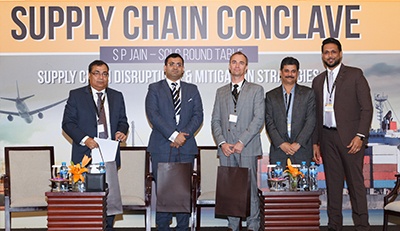
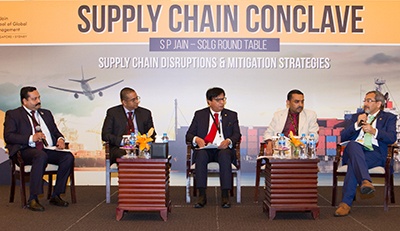
SP Jain Supply Chain Conclave’s Dubai chapter, a Round Table Conference in association with SCLG, was held on 8th March 2017, at Shangri-La Hotel. The conclave witnessed a confluence of great minds from the Supply Chain industry of the Middle East. Like minded professionals came together and utilised this platform to discuss the impact of disruptions on the present and future of the Supply Chain industry. Understanding these disruptions, coping with them and designing mitigation strategies were the top priorities for the industry leaders.
The event began with a welcome note by Professor Christopher Abraham, Head-Dubai Campus & Sr. Vice President-Institutional Development, SP Jain School of Global Management. He introduced the keynote speaker for the conclave, Ms. Baljeet Nagi, Director- ERP-SCM Sales Development & Strategy, Oracle. Ms. Nagi emphasised on the need for the supply chain industry to embrace digital disruption, agility, transparency, security and real-time data.
The first Panel discussion, with the theme Lessons from Recent Supply Chain Disruptions and Mitigation Strategies was moderated by Dr Dhrupad Mathur, Assistant Dean-Executive MBA & Associate Professor, IT Management at SP Jain. Dr Mathur gave the audience a brief introduction about supply chain disruptions, citing examples from the past and discussing their impact. The panel speakers, then shared their thoughts on a host of topics such as the types of disruptions and their major and minor impacts on the industry, strategic and tactical impacts of disruption, outsourcing services that are prone to disruption and ways of mitigating them.
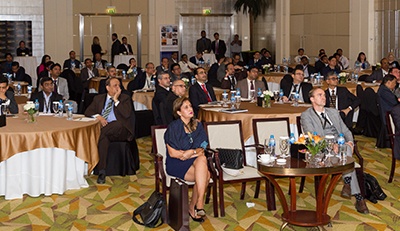
Mr. Koshy Mathew, Chief Operating Officer, Enhance UAE- WJ Towell Group, informed the audience how the reputation of a brand is directly proportional to its products being available on shelves. Planning is the key to successful mitigation of disruptions, he said. Consumer experience, marketing and sales along with efficient supply chain are the pillars of a business.
The discussion came to a humorous end with Dr Mathur quoting, “If you are determined towards disaster, technology helps you get there faster.”
After a networking coffee session, the second panel discussion was introduced. Mr. Ravi Kuchimanchi, CEO, LaunchPad International, President- Executive Committee, SCLG & Managing Partner, Velocity Ventures, moderated the panel. The theme for this discussion was Potential Disruptions in Global Supply Chains & Roadmap for The Future. He engaged the audience with a presentation that covered various global mega trends such as world politics, global ideologies, changing consumer expectations, and many more.
As the discussions gained momentum, the panellists answered a host of questions related to supply chain disruptions and the future of the industry.
Mr. Flemming Anderson, Area Logistics Manager, Wilhelmensen Ships Service, suggested that local and regional firms must collaborate with technology to ensure better 3PL strategies for the future. Data is driving a radical shift in the supply chain industry along with new technologies such as hybrid airships and drones. Humans are the biggest disruptions in the future and technology.
Post this discussion, the panel members answered a few questions raised by the audience that dealt with taking and embracing risks, risk intelligence and the need for companies in the supply chain industry to embrace technology. Mr.Rajiv Aserkar concluded with a warm thank you note. Mr. Chandrashekhar Singh, GM-Corporate Relations at SP Jain School of Global Management then extended heartfelt gratitude to the delegates and the audience on behalf of the college. The delegates enjoyed an insightful event, exchanged thoughts and ideas and networked with each other during the coffee and lunch breaks.
More information regarding the panel speakers and panel sessions can be found below:
Keynote Speaker
- Baljeet Nagi, Director- ERP-SCM Sales Development & Strategy, Oracle
Panel 1
Moderator
- Dhrupad Mathur, Assistant Dean-Executive MBA & Associate Professor, IT Management at SP Jain School of Global Management
Speakers
- Shailen Shukla, Head-Logistics, Jumbo Electronics LLC
- Rajesh GK, Chief Product Officer, UAE Exchange
- Koshy Mathew, Chief Operating Officer, Enhance UAE- WJ Towell Group
- Shirish Deshpande, General Manager-Logistics, Ghassan Aboud Car (GAC)
Panel 2
Moderator
- Ravi Kuchimanchi, CEO, LaunchPad International, President- Executive Committee, SCLG & Managing Partner, Velocity Ventures
Speakers
- Nagesh Suryanarayana, Managing Director, Protiviti
- Sanjay Chandwani, Regional Logistics Director, Richemont, Middle East & India
- Flemming Anderson, Area Logistics Manager, Wilhelmensen Ships Service
Singapore Chapter:
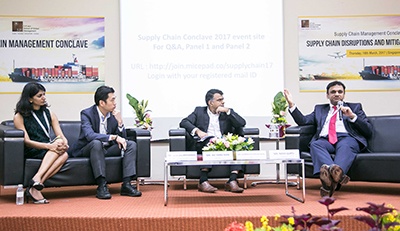
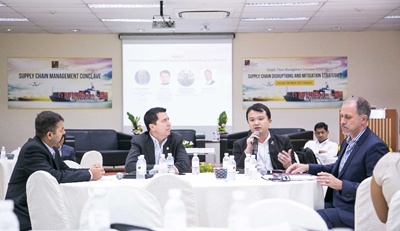
The Supply Chain Management Conclave 2017 was held at the Singapore campus on 16th March. The session was graced by Mr. Dhaval Buch, Chief Procurement Officer at Unilever. In his address, he said that we live in a fast paced, ever-changing world that is oftentimes disruptive – the industry faces various external pressures, from natural disasters to a changing competitive landscape. To operate successfully in such an environment, it is important for supply chains to be agile and to be able to respond effectively to changing market and consumer demands.
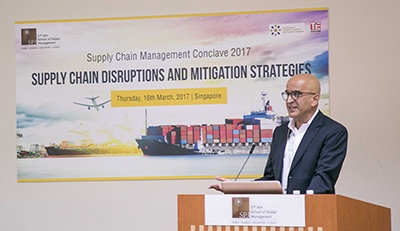
Mr. Buch ended his address by saying, “We always need to be prepared for disruptions – the supply chain of the future needs to be resilient, agile and responsive.”
The Conclave also saw other leading supply chain leaders engage in a two-panel discussion inter-related to supply chain mitigation strategies for the future.
The first panel, Lessons from Recent Supply Chain Disruptions and Mitigation Strategies, was an interactive discussion between the panel speakers and the audience. They shared the lessons learned from past disruptions and their contingency plans in case of similar disruptions in the future.
Ms Nidhi Gupta, Founder of Varehaus, suggested that companies could manage risks more effectively by incident monitoring tools which predict risk hot-spots via multiple sources including news and social media networks.
The discussion also highlighted that one of the only ways disruptions can be planned is to know how fast to react to the disruptions. One cannot control the disruption; but one can control the reaction.
The second panel discussion, Potential Disruptions in Global Supply Chains and Roadmap for The Future, provided some interesting insights of panel members sharing the potential events that may disrupt the global supply chains and the flow of goods. It took the discussions forward from where Panel 1 concluded their deliberations on the past disruptions and the lessons learned. The panel speakers strategised the future course of action in the event of supply chain disruptions.
Mr. Paul W. Bradley, Chairman and CEO, Caprica International, highlighted that disruption is often good and one must embrace it. While political disruptions like Brexit, the fall of trade agreements and global climate changes could be bad, good disruptions would be the many start-ups that are disrupting the different parts of the supply chain.
The ability to understand the consumer behaviour could also affect the whole movement of the supply chain. Data analytics of influencing sources from end to end points are therefore key for planning the entire supply chain.
A shift of business culture or hierarchy might need to be implemented in organisations when it comes to being susceptible to dynamic innovation approaches and perspectives. Therefore, instead of just technology adoption, the organisation should be able to drive change by bringing the right people, to challenge the current business model, and reduce the bureaucracy.
More information regarding the panel speakers and panel sessions can be found below:
Keynote Speaker
- Dhaval Buch, Chief Procurement Officer at Unilever
Panel 1
Moderator
- Bipin Balakrishnan, Director & Counsel, Customs for General Motors International Operations, Singapore
Speakers
- Au Yang Sian, Supply Chain Director, Ferrero
- Chinmaya Vijayakumar, Managing Consultant, IBM
- Nidhi Gupta, Founder, Varehaus
Panel 2
Moderator
- Craig Rawlings Partner, Management Consulting, KPMG (Moderator)
Speakers
- Bireshwar Kumar, General Manager Business Development APAC. Horizon Marine Services Pte Ltd
- Jeffrey Tan, Vice Chairman, Singapore Computer Society (SCS) Supply Chain Management (SCM) Special Interest Group (SIG)
- Paul W. Bradley, Chairman and CEO, Caprica International
-
Mumbai Chapter:
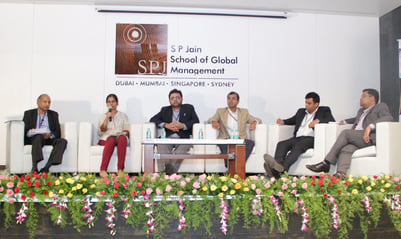
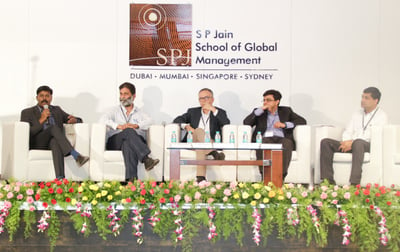
- The Supply Chain Management Conclave 2017 concluded with its Mumbai chapter, held on 5th May. With numerous attendees from different industries coming together, the event was a grand success.
How can we mitigate supply chain disruptions in the fast-paced world? One must carefully understand its vulnerabilities and plan to reduce the probability of the occurrence of such vulnerability and/or reduce the impact it has. As the business complexity grows, more and more functions will eventually be outsourced and it is important that we explicitly consider supply chain risk as priority. The keynote speaker for the evening, Vikash Agarwal, Managing Director, CEVA Freight (India) Private Limited addressed the major supply chain disruption and observed that “One of the casualties of disruption is loss of reputation.” Loss of productivity, increased cost of working, consumer complaints and loss of revenue are the other immediate possible direct impact of disruption to any organisation. 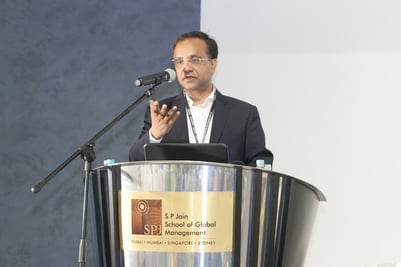
What are the lessons from the recent supply chain disruptions? Participating in the Panel 1 discussion, Somnath Das, Head, Supply Chain Planning and Logistics, Marico Ltd. said, “Good opportunities come from various disruptions.” Disruption opens doors for infrastructure development. Moreover, the world is getting connected and we must adapt to the changes.
Citing the 19 disruptive incidents faced by his company which faced 187 days of disruptions world-wide during 2016, Mudit Dobhal, Head Program Manager, Damco said, “We increased our inland network, created alternate gateways in Asia for water transport improved our air-connectivity to meet the challenges during those days.”
According to Milind Tailor, Head, Supply Chain Management, Diebold Nixdrof, how we plan and address the disruption at the tactical and execution level is very important. It is also important to cross check the credentials of your new vendor with your own check list and priorities before you finalise them, he said. “We have to take multiple solutions to address disruptions of any nature,” he added.
Rohit Batra, Vice President and Head of Supply Chain at Ferrero Rocher felt that, “Each disruption unleashes our ability and if we react in a panic way, there will not be any solution.”
Stella Joseph, Lawyer, Economic Laws Practice explained about the impact of GST in supply chain business. “GST will act as an actual business reform, not just as a tax reform,” she opined. GST offers a huge platform to analyse our operations tax structure and take our business way forward, she said. Through automation and online transactions, GST is supposed to streamline the entire supply chain sector.
The second panel took the discussions forward where the earlier speakers concluded deliberations on the past disruptions and discussed ‘potential disruptions in global supply chain and the future.’
“Depending on the political situations and regulatory issues, it is important to select the vendors for international operations,” said Pradeep Sharma, General Manager, Supply Chain Management, Sun Pharma.
For Arjun Varma, Supply Chain Director, Beiersdorf India, it is important to address the regulatory requirements like usage of banned raw materials, non-recyclable plastics, non-environment friendly items by the FMCG sector while operating in a global environment. “It is difficult to create a global supply chain modular, even though it is need,” he said as a major challenge in the sector.
Making use of the technology – (AI, tracking movements) and usage of data – (environment data, weather data) must put to use to address any disruption which is affecting internationally. “Usage of big data and GPS systems will help supply chain business in a big way to deal with disruptions in a big way,” said, Naval Sabharwal, Global Head, Supply Chain and Logistics, Ramaco Systems.
Citing the example of the implementation of GST in Malaysia, said Neeraj Katare, Executive Director (Leader: Pharma Supply Chain Advisor), PwC, “It took almost three years to stream line the operations in Malaysia, even though it was a positive decision.”
“It is important to use the digital technology in several stages of transportation,” according to Jayanta Chatterjee, Executive Director, Supply Chain, Castrol India.
As far as the future is concerned in the global supply chain segment, the technology used will be much cleaner and environment friendly, opined Sabharwal.
The panel also discussed the recent changes in the global arena including the US presidential elections, vote on Brexit, oil price volatility and climate changes that will have a profound impact on supply chains, terrorist attacks at strategic nodes in the supply chain, regulatory norms governing cross-border trade, cyber security threats and advent of big data and 3D printing and positive disruptions. They also put forward their strategies to meet the challenges arising from the unexpected events at the Supply Chain Management Conclave 2017 organised by S P Jain School of Management recently in Mumbai.
More information regarding the panel speakers and panel sessions can be found below:
Keynote Speaker
Vikash Agarwal, Managing Director, CEVA Logistics
Panel 1
Moderator - Dr. Rajiv Aserkar, Professor & Area Head - Logistics and Supply Chain Management - S P Jain School of Global Management- Speakers -
• Somnath Das - Head, Supply Chain Planning and Logistics – Marico Ltd.
• Mudit Dobhal - Head, Key Accounts Management SCM (India, Bangladesh and Sri Lanka) – Maersk Group
• Milind Tailor - Head, Supply Chain Management – Diebold Nixdorf
• Stella Joseph – Lawyer - Economic Laws Practice
• Rohit Batra - VP and Head, Supply Chain (Indian Sub-Continent) – Ferrero India - Panel 2
Moderator - Neeraj Katare - Executive Director, Leader: Pharma Supply Chain & Operation Advisory –PwC
Speakers -
• Arjun Varma – Supply Chain Director, Indian Subcontinent - Beiersdorf India (Nivea)
• Naval Sabharwal – Global Head, Supply Chain and Logistics – RAMCO Systems
• Jayanta Chatterjee – Executive Director, Supply Chain - Castrol India Limited
• Pradeep Sharma – General Manager, Supply Chain Management – Sun Pharma
